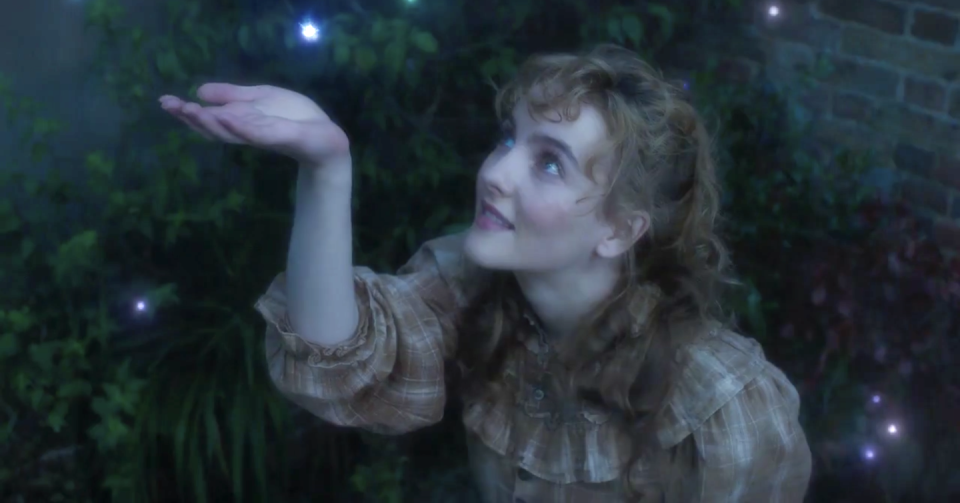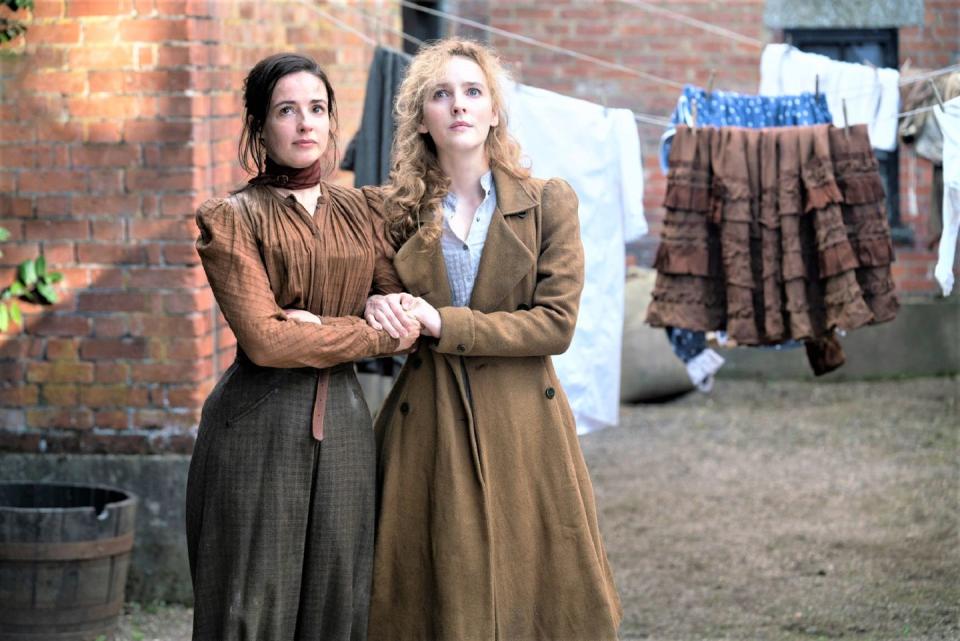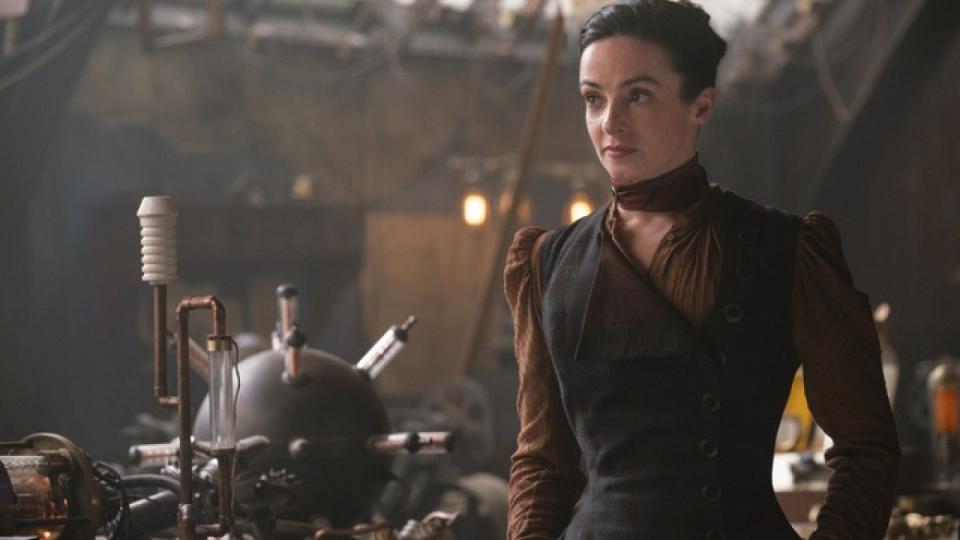HBO’s ‘The Nevers’ Is Basically Another ‘X-Men’

- Oops!Something went wrong.Please try again later.
HBO's The Nevers is essentially a retelling of X-Men, albeit one focused on people called "The Touched."
The show's disgraced creator, Joss Whedon, previously wrote a highly-regarded run of X-Men comics.
Hints and references throughout the show's first episode explain more about "The Touched."
Look, we get it: when you start watching a new show and all of a sudden people start using all sorts of weird terminology out of nowhere with no explanations, it can be frustrating, confusing, and take a bit of time to get oriented. That's as true as ever with HBO's new series The Nevers, which begins with a 2-minute scene that makes almost entirely no sense, and then immediately jumps forward three years and starts talking about people who are "touched" and a spree killer who's about to exceed the notoriety of Jack the Ripper.
The more you watch the show, the more things start to make sense. But in a nutshell, what you really need to know is that The Nevers is basically a new-age HBO retelling (albeit one set in the late 1800s) of the story of the X-Men. The basic story—people who've gained special powers and are threatened to be ostracized from society—is the same, and that's clear from the very first episode.
It's easiest to understand how the show managed to draw itself into such clear parallels with the knowledge that the show initially began as a passion project of Joss Whedon, who previously created Buffy the Vampire Slayer, directed The Avengers, and finished directing the 2017 cut of Justice League, among other things. It's also necessary to mention that Whedon has faced numerous allegations of harboring a toxic and abusive workplace on his projects, and that he exited The Nevers last November, citing "the physical challenges of making such a huge show during a global pandemic," as his reason at the time.

While Whedon is not part of the creative team behind The Nevers for all of its first season, it is very clear to see that he was inspired by the X-Men. In fact, the Buffy creator also was the creator of the Astonishing X-Men series that began in 2004, and wrote a run of 24 issues that ran through 2008 and is among the most highly-regarded in the history of the Marvel Comics superhero team.
Knowing Whedon's place in X-Men history helps to make sense why this new show—at least in the earlygoing—feels so familiar structurally and thematically. It's also worth mentioning that one of the show's key social reference points—the treatment of pre-suffrage women—seems to serve as an unsubtle reflection of the contemporary treatment of women. And given the accusations that have come in recent years against the creator of the show, it feels more than a bit ironic. Still, there's some promise here, and when the second half of the show comes—produced after Whedon's exit—it will be interesting to see if any direction the show takes early begin to veer elsewhere.
So, uh, what exactly are "The Touched" in HBO's The Nevers?
In short? The Touched are basically The Nevers' version of mutants in X-Men. The show's first episode uses the term for the first time after Amalia True (Laura Donnelly) and Penance Adair (Ann Skelly) enter the Hapslisch residence, where they suspect the family's young daughter, Myrtle, is one of "The Touched."
"They're saying Myrtle might be...Touched?" Mr. Haplisch says. "We heard about those girls the last few years. They're...not right."
Amalia, as the show's protagonist, delivers the mission statement of The Nevers right up front in response to Mr. Haplisch: "Neither right nor wrong. Being Touched is not a defect of character."

The conversation moves on to discuss Maladie, a possibly Touched woman in the midst of a killing spree. Mr. Haplisch is convinced that rumors she's Touched bode poorly for the people overall, while Amelia insists that it's purely her homicidal nature causing everyone trouble.
A bit more background comes when we see a discussion by representatives of the Prime Minister who believe they should make a statement one way or another on The Touched. Regardless of where the conversation ends up landing, we learn that the date of what they call "The Attack," (but what we later see as some sort of spaceship raining magic (?) down from above) is August 3, 1896. On this day, a grey Monday, the cases of Touched people began, all rooted in London—and everyone affected was female. "Not one man of stature afflicted," the square man in a chamber said. "That's the genius of it—they came at us through our women." The theory here is that it was some sort of attack on London, in progress. Obviously a villainous point of view, but we're just trying to figure out what The Touched are at this point, and that color helps.
How else is The Nevers like X-Men?
We can tell, too, that Amalia and Penance have been on a fairly long journey looking for more and more of these "touched" to invite to their school, similar to what fans of the X-Men films will recall Charles Xavier (James McAvoy) and Erik Lensherr (Michael Fassbender) doing in X-Men: First Class, as they looked to build out their own roster of mutants. The Nevers follows the same basic idea.

"Let's just try to keep it civil," Penance tells Amalia as they approach Myrtle's house. "Not like with the Innkeeper."
"He had a shotgun," Amalia responds, before Penance mentions that she's heard that excuse before. "When they have shotguns!" Amalia explains again. In just a few lines of dialogue, we can tell that this pair has been on the hunt for their fellow Touched (both have powers of their own) for the majority of the three year time jump between the show's opening scene and most of the rest of the events of the first episode.

Upon finding and recruiting the "Nevers," Amalia and Penance try to convince them to come to The Orphanage (run by Lavinia), where they can feel more comfortable and be among people like them. That's basically an identical concept to the X-Mansion run by Professor Charles Xavier in every form of X-Men, whether it be film, animation, comic books, etc. Professor X mentoring the younger mutants is a primary facet of any X-Men story, and it seems like Whedon was happy to take influence from that dynamic when putting The Nevers together.
And while we did compare Amalia and Penance to Professor X and Magneto above, it seems more like the character of Maladie, the unstable spree killer, would be more of a parallel for Magneto than Penance (barring an unforseen dark streak for the latter character). Where Amalia seems to value peace and teamwork (like Professor X), Maladie (also Touched) instead chooses to settle the disdain from the public with violence, as evidenced with her display at the opera—which feels like a page out of the Magneto playbook.
It's a lot! But if you're a fan of the X-Men and jonesing for it, hey, there are worse places to go than a series with HBO's stellar production value.
You Might Also Like

